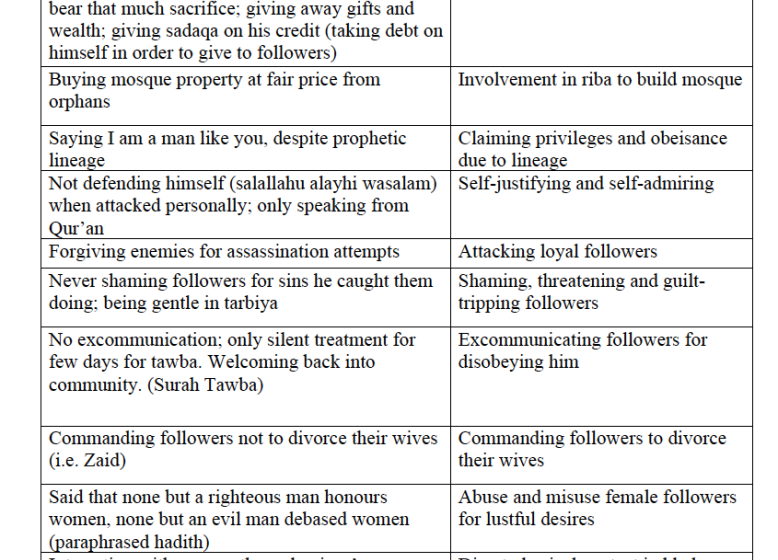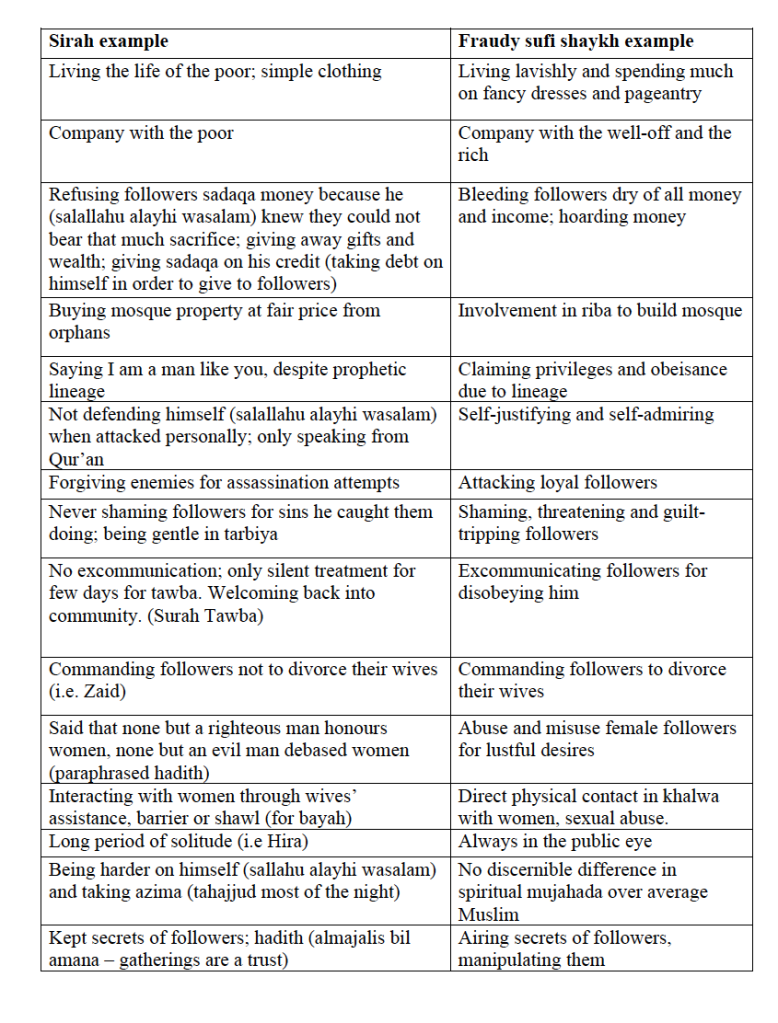
Making Sense of the False Sufi Shaykh
Lately there has been credible reports of sufi (and sufi-affiliated) shaykhs who have been exposed as frauds. (See here and here) This is not new. There have been so many Muslim scandals and controversies online in the past year or so, it is best if you are a scholar, to just be away from the Internet and be forgotten.
The False Shaykh
But the nature of this news makes me wonder as to human nature and how much Islam changes a person – for the better or the worse.
For one thing, what makes one sufficiently purified to be a murshid? Doesn’t the ahadith say that rust comes on the heart every day and so how can one ever reach that point of being purified? Even, if one claims they are protected by Allah from sin, there is no way of verifying that. And so it is fertile ground for abuse.
There have always been false shaykhs. Salesman by other names, wolf in sheep’s clothing, who prey on Muslim money and women, who dress ornately in pristine white clothing that make them look angelic. Whose words are so smooth and eloquent, it is essentially sihr. I always wonder do these shaykhs ever go on 40 day khalwa? Why are they always in the public eye? Why are they people of the zahir (outward) yet claim to be people of the batin inward? Isn’t riyya a sin? Why is it when it comes to problems, they never spill the beans? Or when it comes to deep spiritual secrets, they only explain from the latest English translated Islamic texts? If they are so erudite, why not teach us those Arabic books? Why are their murids middle-class or upper-class? Where are the poor?
“Sidi, sidi, sidi, Can’t you see? Sometimes your words just hypnotize me. And I just love your Sufi flavour…”
This brings me to my next point: maybe the false shaykh never was a shaykh. Or maybe he was a shaykh at some point, even for 15 minutes, and then was corrupted. Really, today, our false shaykhs have millions of Muslims giving them attention, how can a human being not be corrupted sooner or later? How much more dhikr and istighfar do you need to do when you have followers confessing to you their sexual secrets, bad thoughts and sins? Imagine you are a naive pious sufi shaykh who has never heard of these sins and your mind runs wild and now you have to clean this laundry, these difficult to wash stains, from the clothing of your followers. And now you have to see these people or talk to them. Maybe one or two of your female followers is beautiful and enamoured by you. Can you resist? Can you keep your heart pure? Really, the ideal shaykh would have to be a robot. The whole shaykh-murid-tariqa structure is problem-ladden for abuse and sin, not spiritual refinement and betterment. It closes Muslims off from the rest of the ummah, to permit sin and enable criminals.
The old sins of the Muslim world are rife in the modus operandi of these false shaykhs: Women are abused, disrespected, blamed victims, seen as objects, disbelieved when they cry out. Dementia and 70 excuses are cited as excuses. Someone has a dream of Rasulullah (salallahu alayhi wasalam) supporting their agenda. Inaction and silent complicity abound. Bribery, blackmail and spilling secrets are primary weapons. The tariqa turns into a microcosm of the Middle Eastern dictatorships; weaponized with sihr, death threats and mukhabarat. The ayah, uphold justice and bear witness to God, even if it is against yourselves… (Surah Nisa, v. 135) is quickly forgotten. Those still loyal can’t see past their fallacy of sunk costs. They may even justify it with self-serving hadith like ‘if you feel no shame, do as you please.’ Those who leave the tariqa, may even lose their Islam.
Sufism in the West as a whole is a minefield of sins and dangers. The number of righteous shaykhs is few and hidden. The false shaykhs who do financial and sexual abuse are never called out by the true shaykhs. Perennialism is accommodated. Riyya is commonplace. Photographs of the shaykh, as if he is an Arab king, in the place of ibada and dhikr is permitted. Free-mixing is encouraged. The Qur’an is neglected while singing is emphasized. Distance from the mainstream Muslim Jama’ah is encouraged. And in some cases magic (sihr) is confused with spiritual experiences. All in all, a Muslim will not have his iman strengthened, but risk losing it all.
“And thus I clothe my naked villany / With odd old ends stol’n out of holy writ, / And seem a saint, when most I play the devil.” Richard III (I, iii, 336-338)
‘Tis too much proved, that with devotion’s visage / And pious action we do sugar o’er / The devil himself.
Sufi Shaykh compared to the Sunnah
For those who confuse these false shaykhs with the Sunnah it should be made clear that the Sunnah and the Sirah are quite different from the behaviour of these false shaykhs. I made this chart below to make things clear:

Reverting Back to Old Ways or Creating a False Face
What I have noticed is converts or even born-Muslims clean up their act, but at some point, revert or regress back to their old ways, if not fully, than partially. The sahabas fought each other but resolved it. Yusuf Islam publicly went back to music to some degree. Many converts go backwards somewhat or are Muslim only in name. Muslims who have been given tarbiya go back fully or partially to their old ways. What matters not is going back to old habits, its what happens after that. Will they go back fully? Or find a compromise or a balance? Or repent and return to their Islamic self?
That is the test of iman.
Reverting back to old ways is not an extreme. Its lesser of two evils.
What is worse than this is what happens in the other scenario: going too far towards piety to the point you create an image of never sinning, of false piety, until one is no longer authentic to who they are and no longer authentic to being a Muslim. Your entire life is a lie. This is when piety becomes a false face of piety that corrupts the soul. It makes one inhuman. And then religion becomes about preserving the lie of being pure and righteous. Until we believe our own lie. This is what I believe happens to false shaykhs who have fallen who were perhaps pure at some point but no longer. This is what I believe tawba is meant to prevent.
The Nature of Corruption
I met a former Christian priest that was kicked out of their congregation and I saw this priest was so corrupted now to the point all they said was lies and delusions. I think spiritual power corrupts. Allah does not give us that level of power. He can act through His servants but we have no such claim to any spiritual authority. We are all dependant on Allah. And Allah choses His friends but He doesn’t need friends who look impressive or who fundraise or who give bayans. If a wali does a karama (miracle) in a forest, and no one sees him, is he still a wali? Of course. The inner reality and what our social experience sees is different. I believe in our age the masjid uncle is more likely to be a wali than some of the scholars we listen to, for no other reason than he has been protected from fame by being ignored. The hidden awliya are perhaps hidden for a divine reason – to protect them from corrupting their heart. Maybe Allah gets His real work done through the unacknowledged.
Perhaps this is the wisdom behind the hadith: The Hand of Allah is over the Jama’ah.
The Greeks had an understanding of the dangers of being too virtuous. They felt the gods would become jealous of their gifts and smite them. They also had an institution called ostracism, a ten-year exile, where a politician was removed from office just to reduce the envy people felt for him. Aristides, the Just, was removed because of excess virtue because people were fed up of hearing him called The Just everywhere (only Allah is The Just by the way). After ten years jealousy died out, he could safely return and everyone forgot his justice. So even the Greeks knew hiding the virtuous is in the best interests of everybody. Perhaps we should exile our righteous to protect them from spoiling their deen and the dangers that come with being seen as righteous.
Becoming a Spiritual Orphan
What those avid for Allah’s Friendship and Closeness are left with trying to stay away from harm and trying one’s level best to be a good Muslim. The old staples of righteous Muslim are still available: the Qur’an, dhikr, istighfar, fasting, righteous friends, the masjid, studying and reading Islamic books. And lets not forget the sahaba spent much time memorizing Qur’an and studying and acting on hadith. Some may be surprised I never took bay’ah, not for lack of trying. Somehow I was always blocked off by Allah and it just never happened. I have just made do with what the deen provides, Qur’an, books and bayans from as many scholars as I can, which is plenty, and in all that their are plenty of spiritual experiences and openings to experience.
The Muslim world is historically in the period the Christians and Jews were before Islam – they are slowly falling apart and going astray. The decision we have is that of the hunafa – before Nubuwwa; which guidance do we follow when everybody’s guidance is breaking down? Before the advent of the Prophet (salallahu alayhi wasalam), Zaid ibn Amr al-Nawfal decided to avoid the way of the Jews and Christians, seeing the Christians disputing over their theology and the Jews oppressed, he took the way of Abraham and submitted to Allah, to be hanif. He clung to monotheism and will be raised on qiyama as an ummah on his own. Our Prophet (salallahu alayhi wasalam) did the same in the beginning. Near the End of Time, we must remember the beginning of Islam, the pre-revelation wisdom of Nabi (salallahu alayhi wasalam): seclusion, tawhid, shunning idolatry, generosity, trustworthiness, truthfulness and searching for Allah away from the dunya and away from what perturbs the heart. That is how Muhammad ibn Abdullah (salallahu alayhi wasalam) became Muhammad Rasulullah (salallahu alayhi wasalam). That is how he (salallahu alayhi wasalam) sought Allah.
Subhana kallahumma wa bihamdika ash-haduana la ilaha illa Ant astaghfiruka wa atubu ilayk, ameen.



